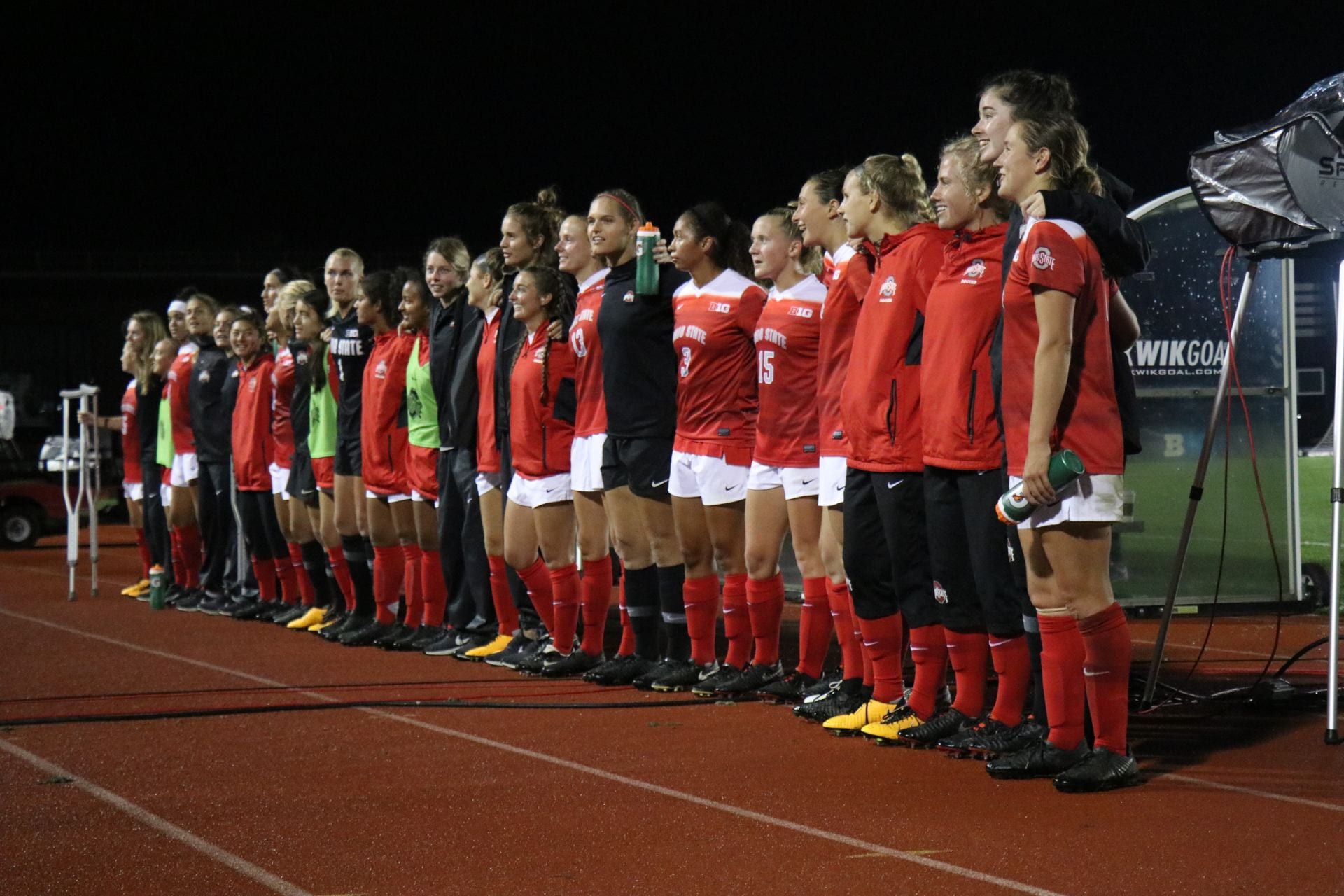
Members of the Ohio State women’s soccer team sing “Carmen Ohio” after the game against Iowa on Sept. 27, 2019. Ohio State won 2-0. Credit: Casey Cascaldo | Former Managing Editor for Multimedia
The Big Ten’s decision to cancel the fall season left a feeling of disappointment in the Ohio State women’s soccer ranks, but it did not slow their momentum.
In her 24th season as head coach of Ohio State, Lori Walker-Hock is dealing with an unprecedented situation with the cancelation of the 2020 season. Despite the cancelation, the Ohio State women’s soccer team is operating with a similar mindset as previous years as they push towards the spring season.
“This is my 29th year of college coaching and my 24th year here at Ohio State. You could throw out basically all my experiences and it’s almost like you’re a rookie coach as far as process,” Walker-Hock said. “My leadership perspective is the complete opposite; I’m as solid as I’ve ever been.”
When she addressed the team upon the season’s cancelation, Walker-Hock said that she emphasized patience and the ability to adapt to the situation at hand.
“My message to them was, like everything, we handle this in stride, we keep it in perspective. Give us some time to understand what this means,” Walker-Hock said.
For the players, the loss of the season was difficult to process at first, but senior defender Izzy Rodriguez said that the team was ready to look ahead to the next challenge.
“We kinda took the night to go with it and then we had to start and refocus ourselves on the next challenge which was going to be a spring season,” Rodriguez said. “I think we’ve done that pretty well.”
Despite the initial wave of emotions, the Buckeyes returned to practice the day following the cancelation. Rodriguez said that although the practice started slow, the team found its energy on the field.
“That next morning, we came into training. It might’ve been a little slow, I think a lot of people were still trying to deal with all the emotions,” Rodriguez said. “As soon as we got back on the field, it felt a little bit back to normal and I think everyone’s energy kind of picked up once we finished practice.”
Since then, the Buckeyes have continued to practice as if they were playing in the fall. Redshirt senior forward Meghan Kammerdeiner said that the team is currently finishing out their preseason training phase.
Walker-Hock said that the training has been a little different since the cancelation due to the fact that they are not preparing for games at this time.
“The way you’re approaching your training definitely changes the level of intensity at that practice,” she said. “There’s more time to get it right because you’re not preparing for a competition.”
Walker-Hock said that the team is using the fall to hone in on fundamentals as well as the long-term development of the players.
While the team continues to attack training towards a spring season, Kammerdeiner said that she still felt that the team could have potentially played a fall season thanks to protocols and guidelines in place at Ohio State.
“I think that everything, our staff, not just on women’s soccer, but everyone down to the people that work our facilities and our facility manager and who she hires have just done an excellent job showing up everyday and making sure it’s the safest place for us to be,” Kammerdeiner said. “I’ve felt more safe coming into practice than I have going into a grocery store.”
Seven of the team’s eight seniors were set to graduate in December, however Walker-Hock confirmed that all seven had decided to stay in the program for a potential spring season.
The difficult decisions for the seniors do not end there — the NCAA announced Aug. 21 that fall sports athletes would be granted an extra year of eligibility regardless if they played out a season or not.
Kammerdeiner said that she would look ahead to graduation and a life beyond soccer, even with the offered extra year of eligibility.
“If we don’t have a season this spring, I think I will be very upset because I will obviously be missing my last year of soccer which I’ve played for 20 years,” Kammerdeiner said. “There’s a lot of other life waiting for me and I’ll be getting started with something new.”
Rodriguez said that she would likely consider returning to Ohio State for the extra year of eligibility.
In terms of recruiting, Walker-Hock said that new challenges have arisen since the pandemic, pointing to the fact that they haven’t seen committed players play in a long time. She also pointed to the difficulties for the recruits and their families, who have not had the opportunities to visit campuses and be around the program, making the process more difficult for them as well.
Although there’s still plenty of uncertainty around the program and the potential spring season, Kammerdeiner said that the team is taking a more positive approach to the prolonged offseason.
“We have something new to look forward to and we have a new challenge ahead of ourselves, so [we’re] looking forward to attacking whatever season we’re going to get in the spring,” Kammerdeiner said.


